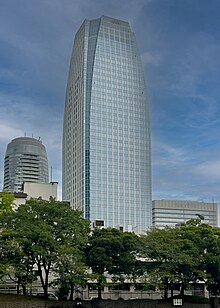NBCUniversal Entertainment Japan
 | |
Native name | NBCユニバーサル・エンターテイメントジャパン合同会社 |
|---|---|
Romanized name | EnubīshīYunibāsaru Entāteimento Japan gōdō gaisha |
| Formerly | LaserDisc Corporation (1981–1989) Pioneer LDC, Inc. (1989–2003) Geneon Entertainment Inc. (2003–2009) Geneon Universal Entertainment Japan, LLC. (2009–2013) |
| Company type | Subsidiary |
| Industry | Mass media |
| Founded | March 1981 |
| Founder | Pioneer Corporation |
| Headquarters | Minato, Tokyo, Japan |
Area served | Japan |
Key people | Shoji Doyama (CEO and president) |
| Products | |
| Services |
|
| Owner | NBCUniversal (Comcast) |
| Parent | Universal Pictures |
| Website | www |
| 1912 | Universal Pictures is founded |
|---|---|
| 1926 | NBC is founded |
| 1928 | Universal Cartoon Studios (later known as Walter Lantz Productions) is established |
| 1943 | MCA Inc. establishes Revue Studios (later Universal Television) |
| 1953 | NBC begins first compatible color broadcasts, preceding other networks by nine years |
| 1956 | NBC's first peacock logo debuts |
| 1963 | American Cable Systems is founded |
| 1964 | Universal Studios Hollywood opens |
| 1967 | NBC broadcasts the first Super Bowl |
| 1968 | American Cable Systems rebrands to Comcast |
| 1972 | Comcast began trading on the New York Stock Exchange (NYSE) |
| 1975 | Universal releases Jaws |
| 1980 | PolyGram renames Casablanca Record & Filmworks to PolyGram Pictures |
| 1982 | Universal releases E.T. The Extra Terrestrial |
| 1984 | Walter Lantz Productions is sold to Universal |
| 1985 | Universal releases Back to the Future |
| 1986 | General Electric buys RCA for $6.4 billion, including NBC and a stake in A&E |
| 1989 | NBC relaunches Tempo Television as CNBC |
| 1990 | Universal Studios Florida opens Law & Order premieres on NBC Sky Television and British Satellite Broadcasting merge to form British Sky Broadcasting Universal Cartoon Studios (later Universal Animation Studios) is established |
| 1993 | Universal releases Jurassic Park |
| 1994 | DreamWorks Animation is founded |
| 1996 | NBC and Microsoft launch MSNBC |
| 1997 | Barry Diller purchases Universal's domestic television assets |
| 1998 | Seagram acquires PolyGram Filmed Entertainment Universal Television is renamed Studios USA Television |
| 1999 | PolyGram Filmed Entertainment is folded into Universal Pictures Universal Studios Florida expands to become Universal Orlando Resort Law & Order: Special Victims Unit premieres on NBC |
| 2001 | Grand opening of Universal Studios Japan Universal releases The Fast and the Furious Vivendi purchases Studios USA |
| 2002 | NBC acquires Telemundo and Bravo Studios USA assets are folded into Universal Focus Features is formed Comcast acquires AT&T Broadband for $44.5 billion |
| 2003 | Universal becomes the first studio with five summer releases breaking the $100 million mark |
| 2004 | GE and Vivendi merge NBC and Universal into NBCUniversal |
| 2005 | The Office premieres on NBC Comcast sets up a joint-venture with PBS, Sesame Workshop & HIT Entertainment to form PBS Kids Sprout Comcast & Time Warner Cable jointly acquire Adelphia Cable assets for $17.6 billion |
| 2006 | USA Network begins 13-year streak as #1 cable network in total viewers |
| 2007 | Illumination is founded |
| 2010 | Universal releases Illumination's first film Despicable Me |
| 2011 | Vivendi divested in NBCU; Comcast buys 51% of NBCU from GE, turning it into a limited liability company NBCUniversal Archives is founded |
| 2012 | Universal celebrates its 100th anniversary NBCUniversal divests its A&E Networks minority stake |
| 2013 | Comcast buys GE's remaining 49% of NBCU Comcast/NBCU assumes full ownership of Sprout |
| 2014 | Comcast attempts to acquire Time Warner Cable for $45.2 billion NBCUniversal reaches a new long-term deal with WWE |
| 2016 | NBCU acquires DreamWorks Animation |
| 2017 | Sprout relaunches as Universal Kids |
| 2018 | Comcast acquires Sky after a heated bidding war with 21st Century Fox |
| 2019 | NBCU acquires Cineo Lighting |
| 2020 | NBCU launches Peacock |
| 2021 | Grand opening of Universal Beijing Resort |
| 2023 | The Super Mario Bros. Movie becomes Illumination's highest-grossing film |
NBCUniversal Entertainment Japan LLC (Japanese: NBCユニバーサル・エンターテイメントジャパン合同会社, Hepburn: Enubīshī Yunibāsaru Entāteimento Japan Gōdō gaisha) (abbreviated as NBCUEJ) is a Japanese music, anime, and home entertainment production and distribution enterprise that is a subsidiary of NBCUniversal, owned by American telecommunications/media company Comcast headquartered in Akasaka, Minato, Tokyo. It is primarily involved in the production and distribution of anime within Japan.
The company was founded in March 1981 by Pioneer Corporation as LaserDisc Corporation, a LaserDisc player production company. In 1989, the company was renamed Pioneer LDC, Inc. as it branched into the anime, music, and film industries, and later Geneon Entertainment Inc. (after being acquired by Dentsu in 2003). In 2008, Geneon merged with Universal Pictures Japan to form Geneon Universal Entertainment Japan, LLC; in 2013, the company changed its name to the current NBCUniversal Entertainment Japan. Some of the well-known anime series the company has produced are A Certain Magical Index, The Heroic Legend of Arslan, Danganronpa: The Animation, Golden Kamuy, and Seraph of the End among many others.
Despite the name, NBCUniversal Entertainment Japan does not distribute Universal Pictures films theatrically in Japan; Toho (through Toho-Towa) exclusively distributes them for Japanese theaters.
History[edit]
Founding[edit]
Pioneer Corporation founded the LaserDisc Corporation (レーザーディスク株式会社, RēzāDisuku Kabushiki-gaisha) in March 1981 to produce LaserDisc players in Japan.[1] The LaserDisc Corporation changed its name to Pioneer LDC, Inc. (パイオニア エル・ディー・シー株式会社, Paionia Eru Dī Shī Kabushiki-gaisha) in 1989 as part of an attempt to branch off into the anime, film, and music industries.[1] As Pioneer LDC, they developed and published several video games for the Sega Saturn and PlayStation, such as games based on Magical Girl Pretty Sammy, Tenchi Muyo!, and Serial Experiments Lain.[2][3][4]
In December 1985, Pioneer LDC would made an effort to expand into the North American business, by establishing a subsidiary in the region named LaserDisc Corporation of America in an effort to consolidate the Pioneer Video and Pioneer Audio units, who maintained the Pioneer Artists label, which was initially based near New Jersey, following the introduction of a combined CD/laserdisc player.[5]
In late 1991, Pioneer LDC established a European division, Pioneer LDCE (short for LaserDisc Corporation of Europe), hoping to revive interest of Laserdiscs in the European market after Philips' Laserdisc players flopped in Europe.[6] Around the same time, the company begin licensing titles from Guild Film Distribution to release 140 films to Laserdisc for the United Kingdom market, and additionally licensed titles from VCL Communications/Carolco Pictures to release 20 titles to the German market.[7]
In 1992, LaserDisc released their first anime title Tenchi Muyo! Ryo-Ohki.[1]

On July 21, 2003, the company was acquired by Japanese advertising and marketing company firm Dentsu and renamed to Geneon Entertainment Inc. (ジェネオン エンタテインメント株式会社, Jeneon Entateinmento Kabushiki-gaisha), while its North American division, Pioneer Entertainment, was renamed Geneon USA.[8][9]
Sale to NBC Universal[edit]

On November 12, 2008, Dentsu announced that it was selling 80.1% of its ownership in the company to NBC Universal's Universal Pictures International Entertainment (UPIE), who planned to merge the company with its Universal Pictures Japan division—which had no longer theatrically distributed Universal Pictures films in Japan, having delegated its theatrical distribution tasks to Toho subsidiary Toho-Towa since the dissolution of United International Pictures Japan in 2007—to form a new company.[10][11] The merger later closed, with the new company known as Geneon Universal Entertainment Japan, LLC. (ジェネオン・ユニバーサル・エンターテイメントジャパン合同会社, Jeneon Yunibāsaru Entāteimento Japan Gōdō-kaisha).[12] On December 9, 2013, the company once again changed its name to NBCUniversal Entertainment Japan LLC.[13]

On February 17, 2013, they made a partnership with Universal Sony Pictures Home Entertainment to distribute their anime titles directly in Australia and New Zealand.[14]
Purchase of Paramount Japan[edit]
On January 1, 2016, Paramount Japan was purchased by NBCUniversal and dissolved shortly afterwards.[15] This was due to Paramount Pictures establishing a joint-venture with Toho-Towa named Towa Pictures Company Limited, which would distribute Paramount's films in Japan.[16]
On July 12, 2017, they announced a partnership with Crunchyroll to co-produce anime with "international appeal".[17]
References[edit]
- ^ a b c "Pioneer Stops Making Laserdisc Players After 27 Years". Anime News Network. January 14, 2009. Retrieved May 29, 2019.
- ^ "Magical Girl Pretty Samy Part 2: In the Julyhelm [Japan Import]". Amazon.com. Retrieved February 20, 2021.
- ^ "Tenchi Muyou! Rensa Hitsuyou [Japan Import]". Amazon.com. Retrieved February 20, 2021.
- ^ "serial experiments lain [Japan Import]". Amazon.com. Retrieved February 20, 2021.
- ^ Seideman, Tony (January 11, 1986). "Laser Players, Disks Carve Market Niche" (PDF). Billboard. p. 47. Retrieved October 16, 2023.
- ^ Clark-Meads, Jeff (February 22, 1992). "Pioneer Pushing Laserdiscs In Europe" (PDF). Billboard. p. 45. Retrieved October 16, 2023.
- ^ Dean, Peter (March 7, 1992). "Pioneer Laserdisc Europe Filling Film Void" (PDF). Billboard. p. 35. Retrieved October 18, 2023.
- ^ "Dentsu acquires Pioneer - News". Anime News Network. July 21, 2003. Retrieved November 5, 2013.
- ^ "Pioneer Entertainment Inc. to Become Geneon". Anime News Network. September 26, 2003. Retrieved February 18, 2021.
- ^ "ジェネオン エンタテインメント㈱一部株式のUPIEへの譲渡とジェネオン エンタテインメント㈱とUPIE子会社との合併について" (PDF). Dentsu. November 12, 2008. Archived (PDF) from the original on July 14, 2014. Retrieved May 29, 2019.
- ^ "Geneon to Merge with Universal Pictures Japan - News". Anime News Network. November 12, 2008. Retrieved November 5, 2013.
- ^ "Geneon Universal Entertainment". Geneonuniversal.jp. Archived from the original on May 21, 2013. Retrieved November 5, 2013.
- ^ "Geneon Universal Ent. Japan is Now Known as NBCUniversal Entertainment Japan" (PDF) (in Japanese). NBCUniversal Entertainment Japan. December 9, 2013. Archived (PDF) from the original on August 24, 2014. Retrieved December 9, 2013.
- ^ "Universal Sony Home Pictures to Release Anime in Australia". Anime News Network. February 17, 2013. Retrieved February 20, 2021.
- ^ サイト閉鎖のお知らせ [Site Closure Notification] (in Japanese). Paramount Japan. January 1, 2016. Archived from the original on March 4, 2016. Retrieved May 22, 2016.
- ^ "Paramount Titles to Distribute Through Toho-Towa in Japan". Variety. October 7, 2015. Retrieved April 29, 2020.
- ^ "Crunchyroll Partners With NBCUniversal Entertainment Japan to Co-Develop Anime". Anime News Network. July 12, 2017. Retrieved February 18, 2021.
External links[edit]
- Official website (in Japanese)
- NBCUniversal Entertainment Japan
- 2003 mergers and acquisitions
- 2008 mergers and acquisitions
- 2016 mergers and acquisitions
- Entertainment companies of Japan
- Mass media companies based in Tokyo
- Anime companies
- Entertainment companies established in 1981
- Mass media companies established in 1981
- Japanese companies established in 1981
- Former Vivendi subsidiaries
- NBCUniversal
- Japanese subsidiaries of foreign companies
- Universal Pictures subsidiaries
- Japanese record labels
